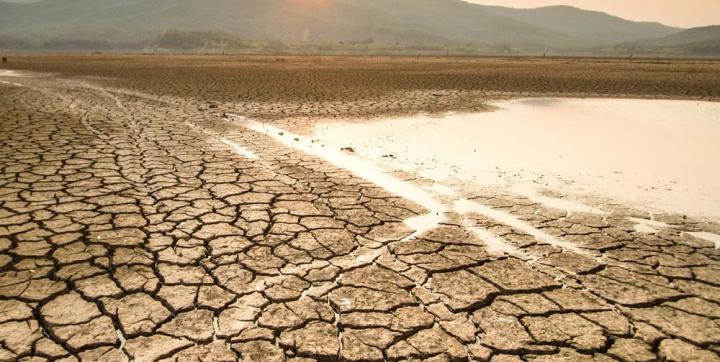Computer model shows how human economic activity can transmit and magnify climate change impact

Credit: Drought.gov
Water scarcity is often understood as a problem for regions experiencing drought, but a new study led by Tufts University researchers finds that not only can localized water shortages impact the global economy, but changes in global demand can have positive and negative ripple effects in river basins across the globe.
In addition to Tufts engineers, the team included experts from the Joint Global Change Research Institute at the Pacific Northwest National Laboratory, and Cornell University.
“We’re finding that water scarcity dynamics are more complicated than traditionally acknowledged,” said Flannery Dolan, a graduate student at Tufts University and lead author of the study. “Changing water supply due to climate change is only part of the story. Regional water scarcity is also driven by changes in global water demands that are often hard to anticipate.”
The study, “Evaluating the economic impact of water scarcity in a changing world,” was published March 26 in Nature Communications, and uniquely captures the interdependent effects of global trade, population and technological growth, climate change, and land management decisions on regional river basins’ water scarcity and economic capacity to adapt to that scarcity.
The researchers used a computer model to simulate thousands of scenarios that reflect a broad array of potential climate, socioeconomic, and hydrologic (earth water cycles and management) conditions in 235 major river basins to better understand how regional water scarcity can have far-ranging impacts on the global economy. Those effects can include altering global trade and consumption patterns in industries such as agriculture, energy, transportation, and manufacturing.
“We are looking at water scarcity as a globally connected and multi-sector phenomenon,” said Jonathan Lamontagne, assistant professor of Civil and Environmental Engineering at Tufts University and corresponding author of the study. “As a result, the study reveals some interesting and sometimes unexpected insights into how local conditions can have reverberations across the globe.”
The research found that global trade dynamics and market adaptations to regional water scarcity can result in positive or negative economic outcomes in every regional river basin considered in the study, depending on both water supply (rainfall, snowmelt, and ground water), and demand-side factors like agricultural production, power generation, and municipal use.
For instance, in the lower Colorado River basin, the worst economic outcomes arise from limited groundwater availability and high population growth, but that high population growth can also prove beneficial under some hydrologic conditions. In contrast, the future economic outcomes in the Indus Basin depend largely on global land-use policies that discourage carbon emissions that can, in turn, encourage overuse of groundwater supplies.
“What is happening elsewhere in the world through differences in regional choices related to energy transitions, how land is being managed, as well as different regional water demands and adaptive choices, can shape relative advantages and disadvantages of a region’s water intensive economic activities,” said Patrick Reed, the Joseph C. Ford Professor of Civil and Environmental Engineering at Cornell.
Restrictions in water availability usually lead to a negative regional economic impact, but the research revealed that some regions can experience a positive economic impact if they hold an advantage over other water basins and become a virtual exporter of water. The Orinoco basin in Venezuela, for example, usually has a reliable supply of water and is often in a relative position that can benefit when other regions are under stress, according to the researchers.
The study also found that small differences in projections for future climate conditions can yield very large differences in the economic outcomes for water scarcity.
“Human activities and market responses can strongly amplify the economic effects of water scarcity, but the conditions that lead to this amplification vary widely from one basin to the next,” said Lamontagne.
A river basin can be considered economically robust if it is able to adapt to drought with alternative sources of water or adjust economic activity to limit usage. If a basin is unable to adapt its supply options and if prolonged water scarcity leads to persistent economic decline, then the researchers describe the loss in water basin adaptive capacity as having reached an ‘economic tipping point.’
For example, in the Indus region in South Asia, the water supply is under stress due to heavy agricultural use and irrigation leading to unsustainable consumption of groundwater, which places it close to the tipping point.
The conditions that lead to these tipping points are highly variable from basin to basin, depending on a combination of local factors and global conditions. In the Arabian Peninsula, low groundwater availability and pricing of carbon emissions are key factors. In the lower Colorado River basin, a mixture of low groundwater availability, low agricultural productivity, and strong economic demands from the U.S. and Europe lead to tipping points.
“It is noteworthy that the lower Colorado River basin has some of the most uncertain and widely divergent economic outcomes of water scarcity of the basins analyzed in this study,” said Reed. “This implies that assumed differences in regional, national and global human activities as well as the intensity of climate change can dramatically amplify the uncertainty in the basin’s outcomes.”
As climate change makes the physical and economic effects of water scarcity more challenging for policy makers to understand, the researchers hope their work will provide the basis for similar analyses and draw attention to the importance of expanded data collection to improve modeling and decision making.
###
Media Contact
Mike Silver
[email protected]
Related Journal Article
http://dx.




